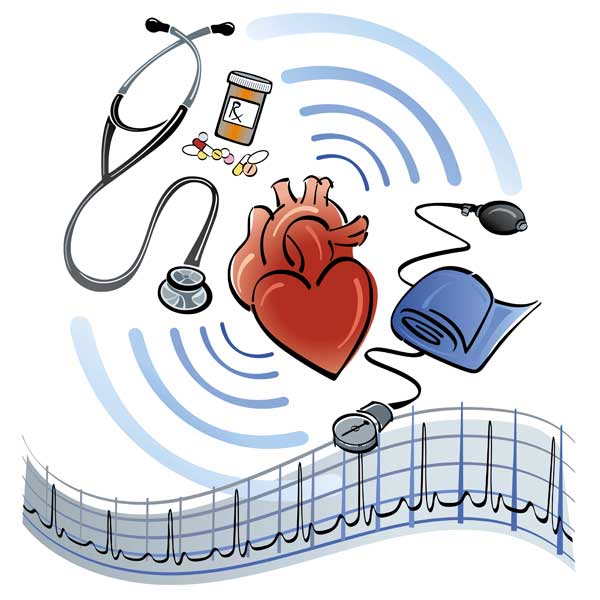Yes, you can take a pill, but it's best to deal with the underlying causes.
High blood pressure, or hypertension, is a chronic disease-and a silent killer. More than one in five adult Canadians has hypertension. The lifetime risk of developing hypertension for those aged 55 to 65 is 90 per cent. Many people are not even aware that they have high blood pressure, because they have no symptoms. "If hypertension goes untreated because it hasn't been diagnosed, it can damage arteries and lead to stroke, heart disease or kidney problems," says Jackie Jayasinghe, a nurse practitioner at the QEII Health Sciences Centre's hypertension clinic. "One of the most important things a person can do to prevent high blood pressure is to get their blood pressure checked by a health care professional at least once a year," she says.
She describes blood pressure this way: "The heart pumps blood around the body through blood vessels called arteries. Blood pressure is the force exerted on the walls of the arteries when the blood is being pumped through them." To test blood pressure, a cuff is placed around the upper arm. The cuff is inflated and the pressure is read using a stethoscope. If an automated machine is used, no stethoscope is required.
Ideal blood pressure is typically 120/80, but the ideal isn't possible for everyone. The "120" refers to the force exerted when the heart pumps (systolic). The "80" is the force exerted when the heart rests (diastolic).

"If someone has kidney disease or diabetes, the target reading is 130/80 or less. If a person doesn't have other health conditions, the target reading is 140/90 or less in the doctor's office. Outside the doctor's office the target is 135/85 or less," says Jayasinghe.
Those different targets are necessary because some people experience the "white coat effect," in which their blood pressure rises because they are at the doctor's office or health centre. Dr. Nick Giacomantonio, cardiologist at the QEII, associate professor of medicine at Dalhousie University, and director of prevention and cardiac rehabilitation for the Capital District Health Authority, says people with "white coat effect" should pay close attention to their blood pressure readings, because a third or more of these people will develop hypertension.
In 2007, 5.7 million Canadians had hypertension, and more than 5 million were taking medications to treat it. Medication can help control high blood pressure, but the greatest control rests with the individual, says Dr. Giacomantonio. "Pills are important, because the scientific literature demonstrates their ability, not only to lower blood pressure, but also to reduce the complications of uncontrolled blood pressure: stroke, heart attack, heart failure, atrial fibrillation, kidney failure and death," he says.
It is important that people take their medications in order to prevent those negative health impacts, but medication doesn't work by itself. How much or how little medication a person requires can depend on that person's behaviour. People who lose weight, lower their salt intake, quit smoking and engage in regular physical activity may see a drop in blood pressure. "These actions, particularly when combined, will act just like a blood pressure pill, and in many cases, even better," he says.
"Not all medications work the same for everyone," says Jayasinghe. "An individual's age, race, whether or not they are a smoker, and other factors have to be taken into consideration when choosing an antihypertensive medication." Sometimes, people who take blood pressure medications make the mistake of discontinuing those medications if they see that their blood pressure has returned to normal. Says Dr. Giacomantonio: "They fail to realize that their blood pressure is normal because they are taking the pills."
Jayasinghe also points out that, in addition to losing weight and increasing activity levels, reducing salt in the diet can make a big difference in blood pressure. "People may not be aware of the amount of sodium in foods they eat every day." She recommends that people read food labels carefully, and choose foods that have 200 mg or less of sodium per serving. Daily recommended sodium intake is 1500-2300 mg for persons aged 19-50, and 1300- 2300 mg for persons aged 51-70. Prepared foods, condiments and restaurant foods are likely to be high in sodium.
Some people inherit a predisposition to high blood pressure. About five per cent have hypertension from a secondary cause such as a malfunctioning thyroid gland or a blockage in the arteries that supply blood to the kidneys. Sleep apnea can also exacerbate blood pressure, and in that case, it can be difficult to treat.
Those who have concerns would be wise to monitor their blood pressure, but it's worth noting that the automated blood pressure machines in drug stores are not as accurate as those in a doctor's office. Still, they can serve as a screening tool to alert someone to the need to see their doctor. Jayasinghe says, "When a person does have an extremely elevated blood pressure, it helps the medical team to know if this is a sudden incident, or if it has been building over time. The only way they can know that is if the person has been getting their blood pressure checked regularly." She says treatment can differ in each case.
Dr. Giacomantonio says people who have multiple risk factors for heart disease, or who have established vascular disease of the head, heart or legs, or who have diabetes with another risk factor, should talk to their family doctor about the Hearts in Motion program. It is a vascular risk-reduction research program aimed at helping Nova Scotians take control of their health. The 14-week exercise, healthy eating and education program is coordinated by a team of health professionals. Referral is required by a doctor or other health care professional.
The QEII Hypertension Clinic also offers a hypertension education program for the public. It runs for three sessions of three hours each, at the Dickson Centre, QEII Health Sciences Centre, and at the Dartmouth General Hospital and Cobequid Community Health Centre. Contact nurse Brenda Tucker at 473-6158 or 473-1460.
Useful information about heart health can be found at: www.hypertension.ca and www.heartandstroke.com
